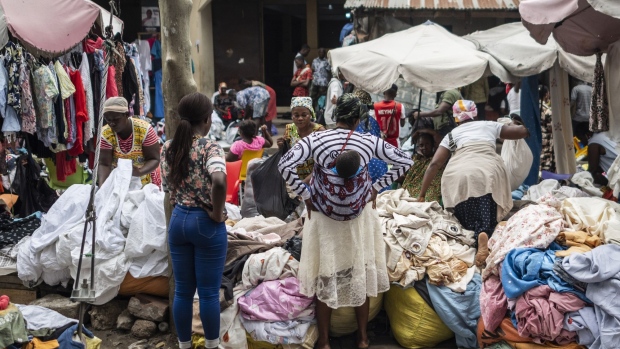Nov 24, 2022
Ghana Proposes Losses for Eurobond Holders in Debt Restructure
, Bloomberg News

(Bloomberg) -- Ghana will ask holders of its international bonds to accept losses of as much as 30% on the principal and forgo some interest payments as it hammers out a debt-sustainability plan to qualify for a loan from the International Monetary Fund.
The West African country will also ask holders of domestic bonds to forfeit some interest payments, Deputy Minister of Finance John Kumah told Accra-based Joy FM radio. He confirmed the planned restructuring in an interview with Bloomberg.
“These are proposals,” Kumah said by phone on Thursday. “We will soon start negotiations with both local and foreign bondholders.”
The country’s eurobonds were steady in early trading in London, with securities due in 2032 rising 20 cents in the dollar to 31.43 by 8:25 a.m. in London, according to Bloomberg generic pricing. The yield fell 19 basis points to 30.77%.
Ghana is negotiating a $3 billion program with the IMF after being shut out of international debt markets amid a selloff of its dollar bonds that lifted yields to distressed levels. The cedi is the world’s worst-performing currency against the dollar this year, lifting the cost of servicing the loans.
In addition to principal cuts, the government is looking to suspend interest payments on foreign bonds for three years. Domestic debt investors would be asked to exchange their existing securities for new ones that may offer a zero coupon in the first year, 5% in the second and 10% in the third year, Kumah said in the broadcast.
“I think the markets may end up welcoming this dose of realism from Accra – especially as it will help bring the IMF on board,” Charlie Robertson, global chief economist at Renaissance Capital, said in an email. “It built up debt due to excessively large deficits -- budget and current account -- for many years, and avoiding this would have required stringent austerity in 2021 and an IMF deal then.”
Gold-for-Fuel
Finance Minister Ken Ofori-Atta during his budget speech on Thursday said that the government was planning a debt-exchange program to lower its borrowing costs after an analysis of the sustainability of its loans showed the West African nation faces a high risk of distress.
Ghana’s vice president, Mahamudu Bawumia, announced separately that the government is considering adopting a policy to use gold to purchase oil products -- an effort to stem demand for foreign exchange by crude importers and support the cedi. The currency has depreciated 57% this year, fueling inflation that topped 40% last month.
The debt reorganization is intended to help Ghana meet sustainability requirements to qualify for the IMF bailout it has been negotiating since September, and possibly reach a staff-level agreement with the Washington-based lender by year-end. The government has set up a committee to start a “backstage engagement” with bondholders, Kumah told Joy FM.
“I’m not surprised they are seeking debt relief, but it’s too early to say at this stage what would be acceptable for external creditors,” said Kevin Daly, a London-based investment director at abrdn.
Yields on Ghana’s $1.2 billion of 2032 eurobonds declined 41 basis points on Thursday to 30.49%. The premium investors demand to hold the country’s dollar bonds rather than US Treasuries was 3,008 basis points, well above the 1,000 level considered distressed.
Fitch Ratings would likely lower the country’s long-term issuer default rating to RD, one notch above default, from CC, if debt gets restructured as part of the IMF talks, it told Bloomberg in an interview last month.
That rating is assigned to an issuer that, in Fitch’s opinion, “has experienced an uncured payment default or distressed debt exchange” on a bond or loan, but hasn’t entered into bankruptcy or some other form of administration.
The ratings company downgraded its assessment of Ghanaian credit in September for the third time this year to four levels below investment grade, from CCC.
(Updates with bond moves in third paragraph)
©2022 Bloomberg L.P.






